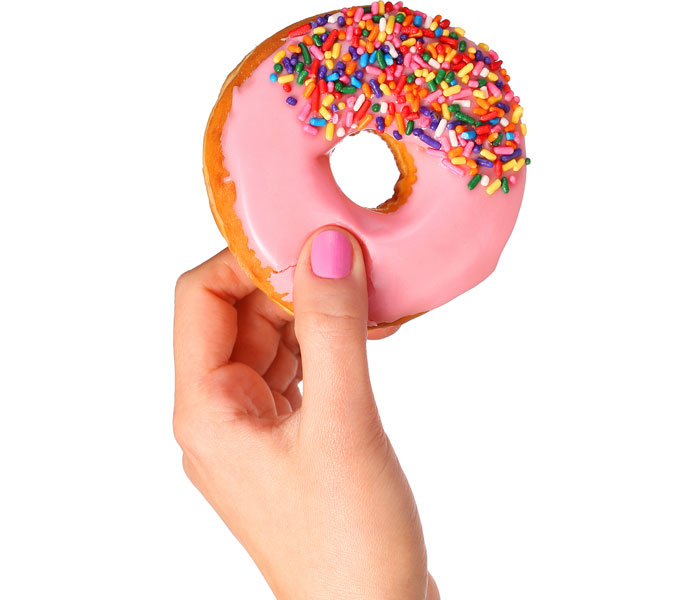You’re trying to lose those extra kilos but it’s not working as well as you’d hoped… You may just need a different approach.
Here are some common tactical errors that may be derailing your plans.
1.You’ve set too conservative a goal
You want to lose 7kg but you decide to set a goal of losing 3kg to start with as it seems more manageable. Actually, researchers now say you’re more likely to be successful aiming for the whole amount from the get-go.
“Your goal should be challenging but possible,” says Professor Yael Benyamini from Israel’s Tel Aviv University. “Then turn it into an action plan focusing on one or two easy changes. Once you have established these as habits, then focus on more changes.”

2. You’ve given up fat
On the face of it, this makes sense – fat contains twice as many kilojoules per gram as carbohydrates – but a recent study looking at the results from low-fat diets versus losing weight in other ways found there is no good evidence for recommending low-fat diets over other methods. Low-carb diets also show better weight-loss results than low-fat ones.
“Fat helps us feel full,” says nutritional medicine practitioner Fiona Tuck. “If we eat low-fat foods we feel less satiated and want more. Low-fat diets also encourage you to eat processed diet foods, many of which are full of sugar and artificial chemicals which play havoc with hormones and the liver. Lose the processed diet foods and eat fresh foods instead.”
3. You’re fixated on kilojoules
There’s a place for counting kilojoules and it’s a popular weight-loss strategy, but it’s not as simple as it seems.
“Everyone’s metabolism is different and we all burn food differently,” says nutritionist Emily Holmes. On top of this, the way we’ve calculated kilojoules in food doesn’t accurately reflect how many we actually absorb from the food when we eat it.
A rare steak, for example, provides 12 per cent fewer kilojoules than a well-done one as we use more energy digesting it – and kilojoule charts don’t take that into account. Don’t beat yourself up if your losses one week don’t tally with what you expect – just look at any move downwards as progress.

4. You’ve gone gluten free
It’s been touted as a magic key to weight loss, but it’s no miracle.
“Wheat and gluten are found mostly in refined carbohydrates and if cutting gluten out of the diet also removes these, most people lose weight,” says Tuck.
But if you swap gluten containing carbs for processed gluten-free alternatives, the opposite might happen.
“Gluten-free processed foods are often higher in refined carbohydrates and starches than their counterparts,” she says. “These quickly turn to sugar in the body and raise insulin levels – which is a big no-no for weight loss.”
5. You’re relying too much on exercise
It’s brilliant for health, amazing for building and toning muscle and for enhancing weight-loss, but “losing weight just by being active is very hard” says personal trainer Ali Cavill.
“Not to mention that exercise has an effect on hunger and appetite hormones which can make people eat to compensate.”
In fact, experts believe this compensation effect is why 70 per cent of women asked to exercise for weight loss ended the 12-week trial fitter, but fatter.
“A successful weight-loss plan has two parts – healthy food choices and physical activity,” says Cavill.

6. You’re measuring results by the scales
For starters, the scales don’t register whether your weight loss is fat, water or muscle, which does matter in terms of how your results look. Also, the number on the scales is not the best motivator – photos and measurements are better, says a new study.
“Measure weekly and take photos every three to four weeks,” advises Dr Isaac Kuzmar from Spain’s University of Alicante. He says this is when you’ll notice the biggest changes.
7. You don’t allow for any treats
Dieting tends to come with an all-or-nothing mentality. Fall off the wagon one day and that’s it – you’ve failed. However, planned cheat days, where you know when you’re going to stray and what foods you’ll eat, will prevent this, shows new research.
People who cut back a little bit more for six days a week, and had one planned cheat day, were better able to stay motivated and retain self-control than those who ate the same amount each day.
8. You’re relying on willpower
“Willpower is like holding your breath – you can only do it for so long – and every time it fails you reinforce the idea that you’re weak,” says Domini Stuart, author of You Can Beat The Binge! “Success comes from changing your mindset so you see your choices as being kind to yourself.”
Stuart suggests that “each day you think of one tiny thing that would make you feel better about yourself – perhaps replacing your normal lunchtime soft drink with water – and choose to do it. Once you do, praise yourself.”
As you repeat this process, making the best choices will become a habit – and you don’t need willpower to do something habitual.

9. You’re losing weight too slowly
It’s said to be the sensible approach, but if you’d prefer a rapid weight loss plan, that’s fine. Says Dr Michael Mosley, author of The 8-Week Blood Sugar Diet: “So long as you have a plan as to how you are going to maintain your weight afterwards, you’re no more likely to regain weight than someone who has lost it slowly.”
In an Australian study 80 per cent of dieters losing weight over 12 weeks reached their goal, compared to 50 per cent of those taking 36 weeks to reach the same goal. Both groups had the same risk of regain.
Rethink your weight loss
So, if you’ve been doing everything wrong, what should you do to get it right? Here are our expert tips:
Eat fresh food in its natural state. “But even then, remember portions matter. You won’t lose weight eating huge portions of quinoa, either” says Tuck.
Change both what you eat and how you move. “Weight loss is 80 per cent about what you put in your mouth and 20 per cent about how much you move,” explains Tuck.
Strength train: Cardio burns kilojoules while you do it, “but strength training helps create metabolically active muscle that continues to burn kilojoules after you stop,” says Cavill.
“Aim to become a happy eater,” suggests Stuart. “They don’t deprive themselves; they eat reasonable amounts of food they want, and don’t constantly think about food the rest of the time.”


